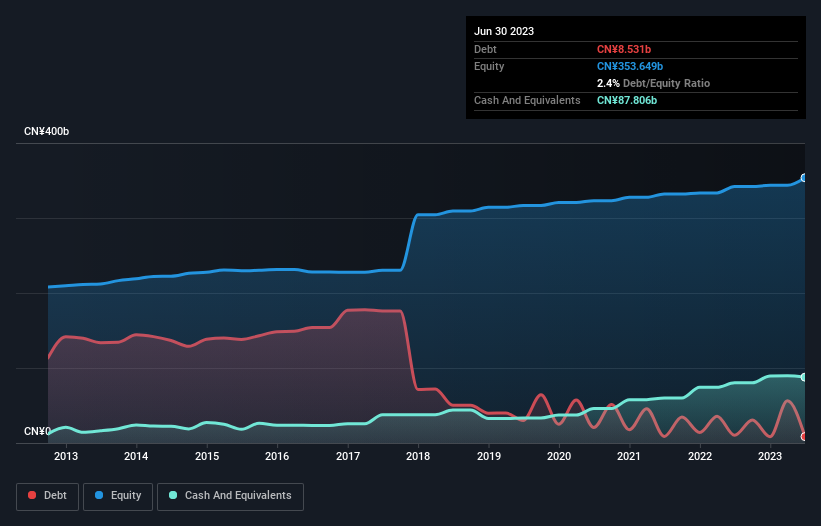- Hong Kong
- /
- Telecom Services and Carriers
- /
- SEHK:762
Is China Unicom (Hong Kong) (HKG:762) A Risky Investment?

Warren Buffett famously said, 'Volatility is far from synonymous with risk.' It's only natural to consider a company's balance sheet when you examine how risky it is, since debt is often involved when a business collapses. As with many other companies China Unicom (Hong Kong) Limited (HKG:762) makes use of debt. But should shareholders be worried about its use of debt?
Why Does Debt Bring Risk?
Generally speaking, debt only becomes a real problem when a company can't easily pay it off, either by raising capital or with its own cash flow. Part and parcel of capitalism is the process of 'creative destruction' where failed businesses are mercilessly liquidated by their bankers. However, a more frequent (but still costly) occurrence is where a company must issue shares at bargain-basement prices, permanently diluting shareholders, just to shore up its balance sheet. By replacing dilution, though, debt can be an extremely good tool for businesses that need capital to invest in growth at high rates of return. The first step when considering a company's debt levels is to consider its cash and debt together.
Check out our latest analysis for China Unicom (Hong Kong)
What Is China Unicom (Hong Kong)'s Debt?
You can click the graphic below for the historical numbers, but it shows that China Unicom (Hong Kong) had CN¥8.53b of debt in June 2023, down from CN¥10.3b, one year before. But on the other hand it also has CN¥87.8b in cash, leading to a CN¥79.3b net cash position.

How Healthy Is China Unicom (Hong Kong)'s Balance Sheet?
We can see from the most recent balance sheet that China Unicom (Hong Kong) had liabilities of CN¥261.1b falling due within a year, and liabilities of CN¥44.6b due beyond that. Offsetting this, it had CN¥87.8b in cash and CN¥68.4b in receivables that were due within 12 months. So its liabilities total CN¥149.5b more than the combination of its cash and short-term receivables.
This is a mountain of leverage even relative to its gargantuan market capitalization of CN¥163.6b. Should its lenders demand that it shore up the balance sheet, shareholders would likely face severe dilution. Despite its noteworthy liabilities, China Unicom (Hong Kong) boasts net cash, so it's fair to say it does not have a heavy debt load!
But the other side of the story is that China Unicom (Hong Kong) saw its EBIT decline by 6.1% over the last year. If earnings continue to decline at that rate the company may have increasing difficulty managing its debt load. When analysing debt levels, the balance sheet is the obvious place to start. But it is future earnings, more than anything, that will determine China Unicom (Hong Kong)'s ability to maintain a healthy balance sheet going forward. So if you're focused on the future you can check out this free report showing analyst profit forecasts.
But our final consideration is also important, because a company cannot pay debt with paper profits; it needs cold hard cash. China Unicom (Hong Kong) may have net cash on the balance sheet, but it is still interesting to look at how well the business converts its earnings before interest and tax (EBIT) to free cash flow, because that will influence both its need for, and its capacity to manage debt. Happily for any shareholders, China Unicom (Hong Kong) actually produced more free cash flow than EBIT over the last three years. That sort of strong cash generation warms our hearts like a puppy in a bumblebee suit.
Summing Up
Although China Unicom (Hong Kong)'s balance sheet isn't particularly strong, due to the total liabilities, it is clearly positive to see that it has net cash of CN¥79.3b. The cherry on top was that in converted 220% of that EBIT to free cash flow, bringing in CN¥22b. So we don't have any problem with China Unicom (Hong Kong)'s use of debt. The balance sheet is clearly the area to focus on when you are analysing debt. But ultimately, every company can contain risks that exist outside of the balance sheet. For instance, we've identified 1 warning sign for China Unicom (Hong Kong) that you should be aware of.
Of course, if you're the type of investor who prefers buying stocks without the burden of debt, then don't hesitate to discover our exclusive list of net cash growth stocks, today.
New: AI Stock Screener & Alerts
Our new AI Stock Screener scans the market every day to uncover opportunities.
• Dividend Powerhouses (3%+ Yield)
• Undervalued Small Caps with Insider Buying
• High growth Tech and AI Companies
Or build your own from over 50 metrics.
Have feedback on this article? Concerned about the content? Get in touch with us directly. Alternatively, email editorial-team (at) simplywallst.com.
This article by Simply Wall St is general in nature. We provide commentary based on historical data and analyst forecasts only using an unbiased methodology and our articles are not intended to be financial advice. It does not constitute a recommendation to buy or sell any stock, and does not take account of your objectives, or your financial situation. We aim to bring you long-term focused analysis driven by fundamental data. Note that our analysis may not factor in the latest price-sensitive company announcements or qualitative material. Simply Wall St has no position in any stocks mentioned.
About SEHK:762
China Unicom (Hong Kong)
An investment holding company, provides telecommunications and related value-added services in the People’s Republic of China.
Undervalued with excellent balance sheet.
Similar Companies
Market Insights
Community Narratives





